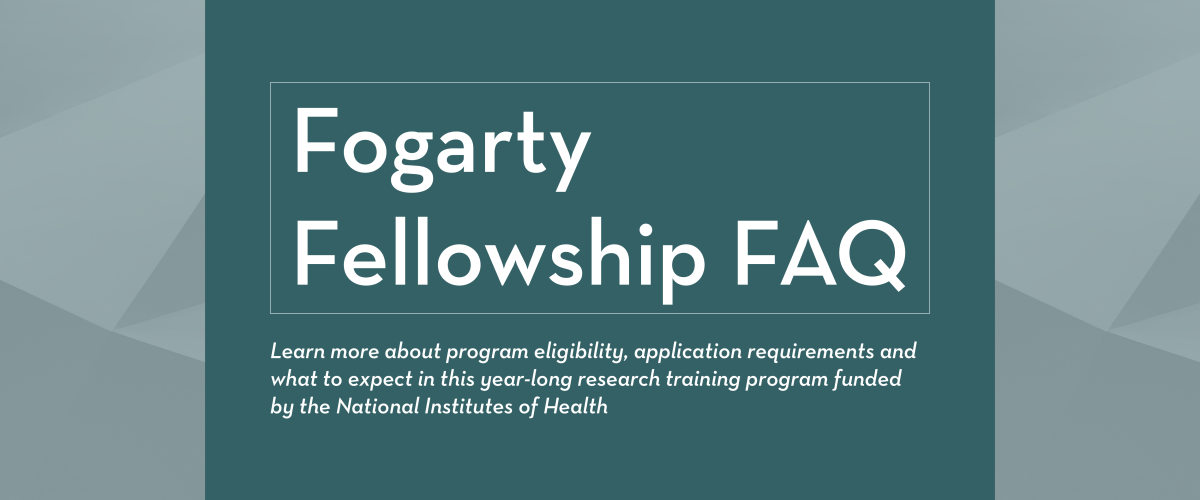Fogarty Fellowship FAQ
What is the Fogarty Fellowship?
The Fogarty Fellowship, known formally as the Fogarty LAUNCH Research Training Program, is a prestigious training program funded by the National Institutes of Health’s (NIH) Fogarty International Center that offers a year of mentored research training to postdoctoral trainees and doctoral students.
This Fellowship is designed for those interested in pursuing a career in research and allows trainees to work at sites in Kenya, Cameroon, Uganda, Ghana, Liberia, Peru, Thailand, Nepal and India.
Research and training topics can fall under a wide spectrum of health themes, including infectious diseases, non-communicable diseases, environmental health, nursing, and policy and implementation science.
The program is unique in that it contains a mentorship component — each program participant works with mentors from their research institution and U.S. institution to hone their research and clinical skills. It is designed for motivated trainees who want to begin a career in research and offers the training and support necessary to ensure program participants are well-equipped to contribute to meaningful global health work in the future.
The University of Minnesota is a member of the Northern/Pacific Global Health Research Fellows Training Consortium. The Consortium is a partnership between the Universities of Washington, Hawaii, Indiana, Michigan and Minnesota, with international partnerships in Kenya, Cameroon, Uganda, Ghana, Liberia, Peru, Thailand, Nepal and India.
Who is Eligible to Apply?
Any UMN post-doctoral or doctoral student is eligible to apply. The program has had Fellows from various colleges and schools, including the Medical School, School of Public Health and School of Nursing.
In addition, researchers from outside the UMN, who are citizens or permanent residents of the United States, Cameroon, Ghana, India, Kenya, Liberia, Nepal, Peru, Thailand or Uganda are eligible to apply.
The program recruits students who are serious about research and pursuing a career in academia; it’s recommended, though not required, that applicants already have experience in global health research settings.
When Does the Program Take Place?
Fellowships start July 1 of each year. Applications open in the spring and are reviewed between September and November. Fellows must be able to spend 12 months at their research site. Applications for 2025-26 fellowship are now open; applications are due Sept. 13, 2024.
Where Does The Program Take Place?
Eligible training sites exist in Kenya, Cameroon, Uganda, Ghana, Liberia, Peru, Thailand, Nepal, and India.
What are the Research Topics Covered?
Research themes covered by the Fellowship may include:
- Infectious diseases
- HIV, malaria, tuberculosis, herpesviruses, HPV, HTLV
- Key non-communicable and chronic health problems
- Cancer, pulmonary and cardiovascular disease, child development and mental health, women’s health, genetics, and nutrition
- Environmental health
- Built environment, tobacco use, lead toxicity, slum upgrading
- Trauma
- Policy
- Nursing
- Oral health
- Engineering and implementation science
How Does the Program Benefit Aspiring Researchers?
The Fogarty Fellowship provides in-depth training, methodological support and career guidance for program participants. It is a hands-on program that allows Fellows the autonomy to complete cutting-edge research while also providing the necessary training and oversight to ensure project success.
Past Fellows have gone on to careers in research and health. The experience provides Fellows an entry point into clinical research in addition to numerous opportunities to network and build institutional relationships.
More than 800 publications have resulted from Fogarty Fellows.
What Does the Application Process Entail?
Before starting an application, prospective Fellows must choose a research site, research topic and program mentor.
Applications are submitted at fogartyfellows.org. A complete application includes the online application form and the submission of letters of recommendation.
The online application requires applicants to submit:
- Unofficial transcripts (predoctoral applicants only)
- A research proposal
- A tentative budget for their study
- Personal statements
- A list of mentors
- NIH biosketches and personal background information
- Two letters of recommendation; a third letter is optional
For the research proposal, applicants are welcome to design their own research study through the guidance of their mentors or to integrate into a study currently being conducted.
How Do Fellows Choose a Mentor?
Applicants must have a mentor at a U.S. institution within the NPGH consortium (Universities of Hawai’i, Michigan, Minnesota, Washington, and Indiana University) who has reviewed and endorsed their Fogarty application, and will support them during their fellowship year.
Applicants must also have a mentor at one of the program’s approved international partner sites who has reviewed and endorsed their Fogarty application, and will support them during their fellowship year.
A list of potential mentors can be found on the Northern/Pacific Global Health Research Fellows Training Consortium’s website. Applicants are not required to choose a mentor from this list.
What Can A Fellow Expect To Do During the Program?
The fellowships begin with an intensive orientation program at the NIH campus in July, followed by mentored research training at international partner institutions. While completing their research project, each trainee will work with their mentors throughout the 12-month program and be provided with research-specific knowledge, methodological support and career guidance.
Fellows will also complete a 12-month curriculum specifically designed for the program that will prepare them to be successful grant writers, mentors and leaders in the field of global health.
